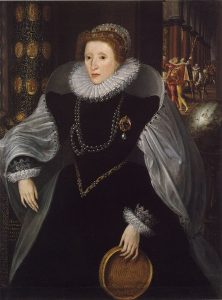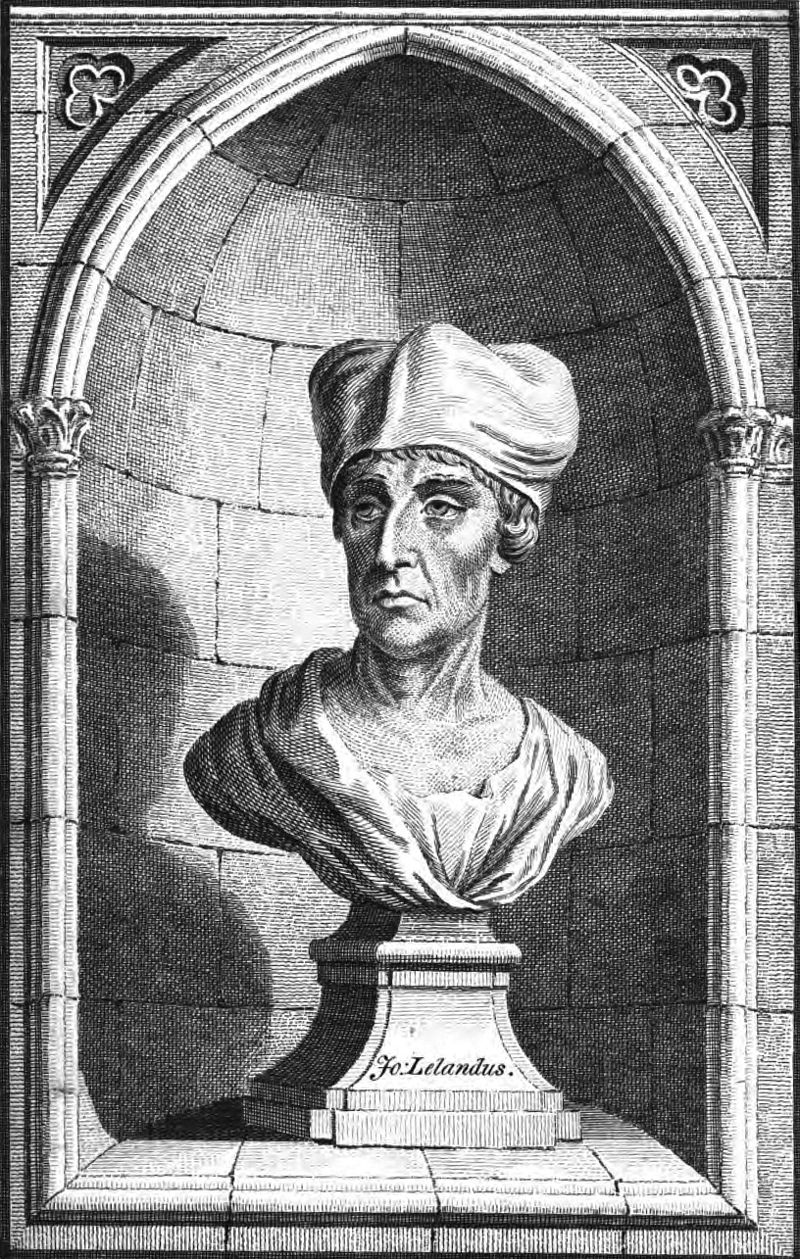On 30th November 1601, Queen Elizabeth I delivered her famous Golden Speech to the House of Commons. She gave this speech to address their concerns over England's economic state of affairs. It was the last speech that she gave to Parliament, and in it, she spoke of her position as queen and her love and respect for her realm and for her members of Parliament.
There are various versions of this speech, but the following version is taken from diarist and MP Hayward Townshend's Commons Journal, printed in Historical Collections: Or, An Exact Account of the Proceedings of the Four Last Parliaments of Q. Elizabeth:
"In the Afternoon, the Commons Attended the Queen at White-Hall, about Three of the Clock, to the Number of One Hundred, and Forty.
The Commons attend the Queen in the Council-Chamber.
At length, the Queen came into the Council-Chamber; where sitting under the Cloth of State, at the Upper End, the Speaker, with all the Commons came in: And after Three low Reverences made, he spake to this Effect:
The Speaker's Speech to Her Majesty.
Most Sacred, & more than most Gracious Sovereign;
'WE Your Faithful, Loyal, and most Obedient Subjects, and 'Commons here present, vouchsafed of Your special Goodness, (to our unspeakable Comforts) Access to Your Royal Presence: Do in all Duty, & Humbleness, come to present that which no Words can express, our most Humble and Thankful Acknowledgment of Your most Gracious Message, and most Bounden and Humble Thanks for Your Majesty's most abundant Goodness, extended and performed to Us.
'We cannot say, (most Gracious Sovereign) we have called, and been Heard; we have Complained, and have been Helped; though in all Duty and Thankfulness, we acknowledge, Your Sacred Ears are ever open, and ever bowed down to Hear us, and your Blessed Hands ever stretched out to Relieve us.
'We acknowledge (Sacred Sovereign) in all Duty and Thankfulness; we acknowledge, That before we Call, your preventing Grace, and all-deserving Goodness do watch over Us for our Good; more ready to give, than we can desire, much less deserve.
'The Attribute which is most proper unto God, To perform all he promiseth, (most Gracious Sovereign, Queen of all Truth, of all Constancy, of all Goodness, never wearied of doing Good unto us, which the Deeds themselves do speak) That we must render unto You most Zealous, most Careful to provide all good Things for us, most Gracious, most Tender to remove all Grievances from us, which all Your Princely Actions have ever shewed. And even now, Your most Gracious published Proclamation, of Your own only meer Motion, and special Grace, for the Good of all Your People, doth witness unto us.
'We come not (Sacred Sovereign) One of Ten, to render Thanks, and the rest to go away Unthankful: But All, of All, in all Duty and Thankfulness, do throw down our Selves at the Feet of Your Majesty. Neither do we Present our Thanks in Words, or any outward thing, which can be nothing, which can be no sufficient Retribution for so great Goodness.
'But, in all Duty and Thankfulness, prostrate at Your Feet, We present our most Loyal and Thankful Hearts; even 'the last Drop of Blood in our Hearts, and the last Spirit of Breath in our Nostrils, to be pour'd out, to be Breathed up for Your Safety.
The Commons fall on their Knees.
After Three low Reverences made, He, with the rest, Kneeled down, and Her Majesty began thus to Answer, Her Self; viz.
'Mr. Speaker,
The Queen answers to them Her self.
'WE have heard your Declaration, and perceive your Care of Our State, by falling into the Consideration of a grateful Acknowledgment of such Benefits as you have Received; and that your Coming is to present Thanks unto Us, which I Accept with no less Joy, than your Loves can have Desire to offer such a Present.
'I do assure you, There is no Prince that loveth his Subjects better, or whose Love can countervail Our Love. There is no Jewel, be it of never so Rich a Price, which I set before this Jewel; I mean, your Love: For I do more Esteem of It, than of any Treasure or Riches; for That we know how to prize, but Love and Thanks I count Unvaluable.
'And, though God hath raised Me high; yet This I count the Glory of my Crown, That I have Reigned with your Loves. This makes me that I do not so much rejoyce, That God hath made Me to be a Queen, as, To be a Queen over so Thankful a People.
'Threfore, I have Cause to wish nothing more, than to Content the Subjects; and that is a Duty which I owe: Neither do I desire to live longer Dayes, than that I may see your Prosperity; and That's my only Desire.
'And as I am that Person, that still (yet under God) hath Deliver'd you; so I trust, (by the Almighty Power of God) that I still shall be His Instrument to Preserve you from Envy, Peril, Dishonour, Shame, Tyranny, and Oppression; partly by Means of your intended Helps, which We take very Acceptably, because it manifests the Largeness of your Loves and Loyalty to your Sovereign.
'Of My Self, I must say this, I was never any greedy scraping Grasper, nor a straight, fast-holding Prince, nor yet a Waster. My Heart was never set on Worldly Goods, but only for my Subjects Good. What You do bestow on Me, I will not hoard it up, but Receive it to bestow on You again: Yea, My own Proprieties I count Yours, and to be Expended for your Good; and your Eyes shall see the Bestowing of All, for your Good. Therefore, render unto Them from Me, I beseech you, Mr. Speaker, such Thanks as you imagine my Heart yieldeth, but my Tongue cannot express.
The Queen bids the Commons rise up.
"Nota, All this while, we Kneeled; whereupon Her Majesty said: Mr. Speaker, I would wish "You, and the Rest to stand up; for I shall yet trouble you with longer Speech.
"So we all stood up, and She went on with Her Speech, saying:
'Mr. Speaker,
And then continues to Speak.
YOu give Me Thanks; but I doubt Me, that I have more Cause to Thank You all, than You Me. And I charge you, to Thank them of the Lower-House, from Me: For had I not received a Knowledg from you, I might have faln into the Lapse of an Errour, only for Lack of True Information.
'Since I was Queen, yet, did I never put my Pen unto any Grant, but that, upon Pretext and Semblance made unto Me, it was both Good and Beneficial to the Subject in general; though a private Profit to some of My Antient Servants, who had deserved well at My Hands. But the Contrary being found by Experience, I am exceedingly beholding to such Subjects, as would move the same at the first. And I am not so Simple to suppose, but that there are some of the Lower-House, whom these Grievances never touched. And for Them, I think they spake out of Zeal for their Countries, and not out of Spleen, or Malevolent Affection, as being Parties grieved. And I take 'it exceeding Gratefully from them; because it gives Us to know, that no Respects or Interests had moved them other than the minds they bear to suffer no diminution of our Honour, and our subjects Loves unto Us. The zeal of which Affection, tending to ease my People, and Knit their hearts unto Me, I embrace with a Princely care; for (above all earthly Treasure) I esteem my People's Love, more than which I desire not to Merit.
'That my Grants should be grievous to my People, and Oppressions privileged under colour of our Patents; our Kingly Dignity shall not suffer it: yea, when I heard it, I could give no rest unto my Thoughts untill I had Reformed it.
'Shall they think to escape unpunished, that have thus Oppressed you, and have been respectless of their Duty, and regardless of Our Honour? No, Mr. Speaker, I assure you, were it not more for Conscience-sake, than for any Glory or Increase of Love, that I desire; these Errours, Troubles, Vexations and Oppressions done by these Varlets and lewd Persons, not worthy the name of Subjects, should not escape without Condigne Punishment. But I perceive they dealt with Me like Physitians, who Administring a Drug, make it more acceptable by giving it a good Aromatical Savour, or when they give Pills, do Gild them all over.
'I have ever used to set the last Judgment-Day before my Eyes, as so to Rule, as I shall be Judged to Answer before a higher Judge, to whose JudgmentSeat I do Appeal, That never Thought was Cherished in my Heart, that tended not to my People's Good. And now, if my Kingly Bounty have been abused, and my Grants turned to the Hurt of my People, contrary to My Will and Meaning; or if any in Authority under Me, have neglected or perverted what I have Committed to them; I hope God will not lay their Culps and Offences to my Charge; who though there were danger in repealing our Grants, yet what danger would I not rather incur for your Good, than I would suffer them still to continue?
'I know the Title of a KING is a Glorious Title. But assure your self, That the Shining Glory of Princely Authority, hath not so dazelled the Eyes of our Understanding; but that we well know and remember that We also are to yeild an Account of our Actions, before the Great Judge.
'To be a KING, and wear a Crown, is a thing more Glorious to them that see it, than it is pleasing to them that bear it: For my self, I was never so much inticed with the Glorious Name of a KING, or Royal Authority of a QUEEN, as delighted that G O D had made Me his Instrument to maintain his Truth and Glory, and to Defend this Kingdom (as I said) from Peril, Dishonour, Tyranny, and Oppression.
'There will never Queen sit in my Seat, with more Zeal to my country, Care for my Subjects, and that sooner with willingness will venture her Life for your Good and Safety, than My Self. For it is not my desire to Live nor Reign longer, than my Life and Reign shall be for your Good. And though you have had, and may have many Princes, more Mighty and Wife, sitting in this State; yet you never had, or shall have any that will be more Careful and Loving.
'Shall I ascribe any thing to my Self, and my Sexly Weakness? I were not worthy to Live then; and of all, most unworthy of the great Mercies I have had from God, who hath ever yet given me a Heart, which never yet feared Forreign or Home-Enemy. I speak it to give God the Praise, as a Testimony before you, and not to Attribute any thing to My Self. For I, O Lord, What am I, whom Practices and Perils past should not fear? Or, What can I do? [These Words She spake with a great Emphasis.] That I should speak for any Glory, God forbid.
'This, Mr. Speaker, I pray you deliver to the House, to whom heartily commend Me. And so, I commit you All to your best Fortunes, and further Councels. And I pray you, Mr. Comptroller, Mr. Secretary, and You of My Councel, That before these Gentlemen depart into their Countries, you bring them All to Kiss My Hand."
You can read another version in The Harleian miscellany at https://archive.org/stream/harleianmiscella01oldy#page/366/mode/2up
.
Notes and Sources
- Heywood Townshend, 'Proceedings in the Commons, 1601: November 27th - 30th', in Historical Collections: Or, An Exact Account of the Proceedings of the Four Last Parliaments of Q. Elizabeth (London, 1680), pp. 253-266. British History Online http://www.british-history.ac.uk/no-series/parliament-proceedings-eliz1/pp253-266 [accessed 29 November 2017].




I don’t know about you but I can’t understand the speech, I guess it’s the wording but I didn’t comprehend it . Is there a simple translation somewhere?
Hi Tisha,
Is there a particular bit you’re having problems with?
You can read an analysis of it in slides at https://shareslide.org/analysis-of-the-golden-speech and there are further explanations at https://www.enotes.com/homework-help/what-elizabeth-golden-speech-about-345434.
The general gist of it is Elizabeth’s love for her country and her people. It was really her goodbye speech. She wants to get across to Parliament her selfless love for them and how much she appreciates their love for her. The main speech starts with “WE have heard your Declaration”. She says “I do assure you, There is no Prince that loveth his Subjects better, or whose Love can countervail Our Love. There is no Jewel, be it of never so Rich a Price, which I set before this Jewel; I mean, your Love: For I do more Esteem of It, than of any Treasure or Riches; for That we know how to prize, but Love and Thanks I count Unvaluable.” which is her saying that there has never been another monarch who has loved his/her subjects more and there is no jewel that is more precious than the love of her subjects. She goes on to say that God may have raised her high but it is her subjects’ love that is the most important thing. She wishes for nothing more than to make her people happy. She sees herself as an instrument of God who has saved her subjects but only with the help of her Parliament. She emphasises that she wasn’t greedy or grasping for material things, only for what would help her people. What she is given she will give back in plenty. She ends by saying that she cannot express her thanks enough, words just aren’t enough.
It is a very powerful and moving speech, very humble and loving, but, at the same time great propaganda to cement that image of her as the queen who had sacrificed everything for her people, the Virgin Queen who was married to her country, the pelican who gave her blood to give life to her children, her people.
Thank you Claire, I will read the analysis, its just some paragraphs I dont comprehend as in the paragraph that starts with “since I was Queen” I Think its just how she words it but Was reading a bit of the analysis and am beginning to comprehend a bit better, thank you for your help
Tisha
That’s ok, I’m happy to help. They were rather wordy in Tudor times and didn’t get straight to the point!